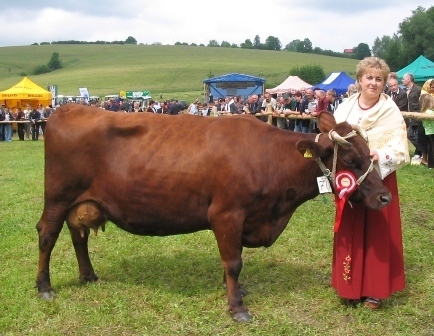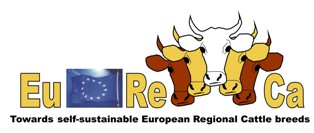Breed of the Month Archive
Polish Red
 |
| Herd-Book creation : | 1895 |
| Nb. Breeding females (2007): |
about 1450 |
| Trend : | upward |
| Location : |
Poland, mainly in the south |
| Local name : |
Polska Czerwona |
| English name : |
Polish Red |
|
History
The Polish Red breed is descended from the prehistoric line of
short-horned cattle (Bos taurus brachyceros). The origins of Polish
Red cattle breeding date back to the second half of the 19th
century, when herds of this breed were established in Polish lands,
especially in the south. Source data suggest that the first herds of
Polish Red cattle were already created around 1850. A turning point
for the breed was the initiative of 14 breeders from southern
Poland, who established the Society of Polish Red Cattle Breeders in
1894. The Association of Red Cattle Breeders was created in 1895 at
the Kraków Agricultural Society. This year marked the beginning of
regular breeding work for this cattle. In the interwar period, the
Polish Red breed accounted for 25% of the national cattle
population. In the 1960s, there were still about 2 million cattle of
this breed, which accounted for 18% of the population. This was
followed by a rapid decrease in the population of Polish Red cattle,
due to the elimination by more productive breeds and the use of
improvement crossing with imported red cattle (mainly Angler).
To protect the breed from extinction, a programme for the genetic
resources conservation of Polish Red cattle was started in 1999. The
programme is currently coordinated by the National Research
Institute of Animal Production.
Breed Description
Polish Red cattle have uniform colour ranging from red to dark red,
with dark claws and nostrils and dark-ended bright horns. The breed
is characterized by good resistance and health, longevity, very good
fertility, easy calvings, high viability of calves, which are easy
to rear, and high biological value of milk. Other important traits
are excellent adaptation to the harsh environment, the ability to
reduce performance so as to survive seasonal food shortages, and
fairly quick restoration of lost body condition. The breed is also
undemanding in terms of feed quality. As regards conformation,
Polish Red cattle have strong legs and hard claws. Thanks to these
traits, the breed is well adapted to living and production
conditions in the submontane and mountain areas. In addition, their
milk has important quality traits such as high protein, fat and
solids content, high biological value and suitability for
cheese-making. In 2006, the average yield of the cows included in
the genetic resources conservation programme was 4028 kg of milk
containing 4.28% of fat and 3.34% of protein.
Previous/Future Conservation
The current population of Polish Red cattle stands at 1450 animals
in 180 herds. By 2013, the number of cows is projected to reach
4500. The current subsidy per cow involved in the programme is 300
EUR, and is projected to increase by 10% in 2008.
Contact
Zenon Choroszy, e-maile: zchorosz@izoo.krakow.pl



